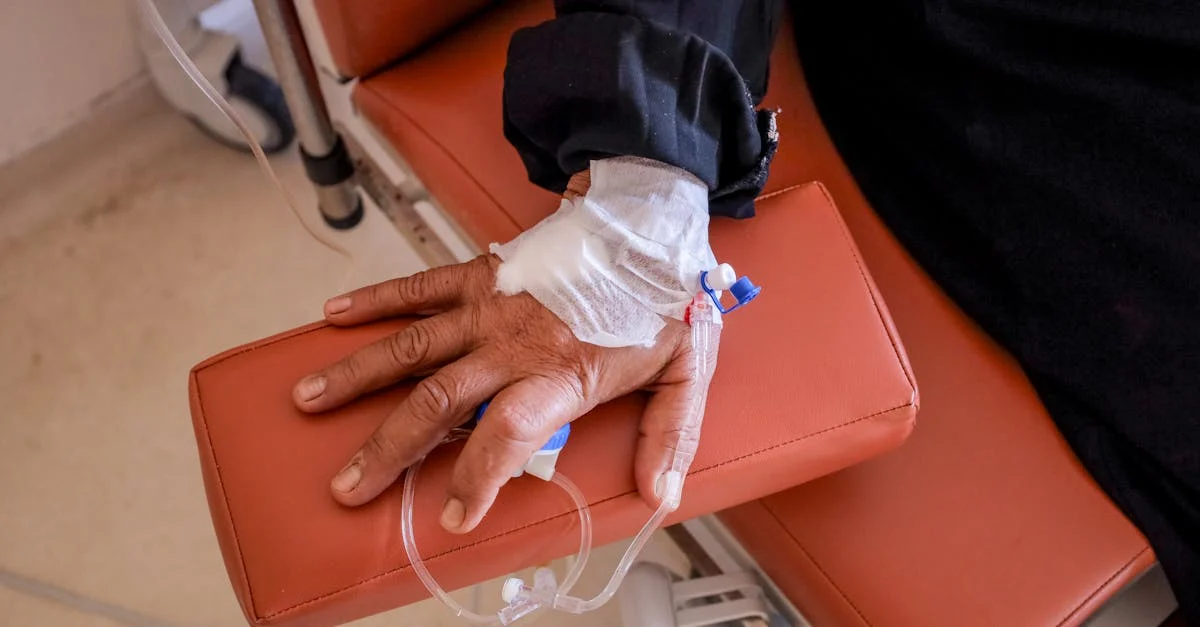Navigating the journey of chemotherapy can be daunting, but understanding what to avoid can make a significant difference in your experience. As someone who’s seen the impact of chemotherapy on patients, I know that small choices can have big consequences. It’s not just about what you should do to support your body during treatment; it’s equally crucial to be aware of what to steer clear of.

Chemotherapy can be tough on the body, and certain activities or habits might exacerbate side effects or hinder recovery. From dietary choices to lifestyle adjustments, knowing what to avoid can empower you to take control of your health during this challenging time. Whether it’s skipping certain foods or avoiding specific environments, these decisions can help you maintain your strength and well-being. Let’s explore some key things you should definitely avoid while undergoing chemotherapy to ensure you stay on the path to recovery.
Key Takeaways
- Avoid Specific Foods: Refrain from consuming raw and undercooked foods to minimize infection risk due to weakened immunity. Limit high-sugar and processed foods to maintain blood sugar balance and reduce inflammation.
- Steer Clear of Extreme Activities: Avoid intense workouts and physically demanding activities which can cause stress and injury. Opt for gentle exercises like walking or yoga, and consult with an oncologist before starting any new routine.
- Don’t Miss Medical Appointments: Skipping medical appointments can disrupt treatment progress. Regular check-ups help in monitoring side effects and adjusting chemotherapy regimens for optimal effectiveness.
- Avoid Harmful Lifestyle Choices: Smoking and alcohol consumption can interfere with treatment, exacerbate side effects, and weaken the immune system. Ceasing these habits contributes to a healthier recovery process.
- Ensure Adequate Rest: Inadequate rest can intensify fatigue, a common side effect of chemotherapy. Establishing a consistent sleep schedule and maintaining good sleep hygiene is vital for energy and recovery.
- Manage Side Effects Proactively: Use prescribed anti-nausea medications and adopt dietary strategies to combat nausea. Balance rest and activity to handle fatigue effectively, and maintain oral health to prevent complications.
Understanding Chemotherapy
Chemotherapy uses powerful drugs to target and destroy cancer cells. This treatment aims to eliminate malignant cells, although it can affect healthy cells too. These drugs are administered in various forms, such as oral pills or intravenous injections, based on individual needs. Side effects like nausea and fatigue occur as chemotherapy attacks cancer, as well as some healthy cells.
Different chemotherapy regimens exist, tailored to the specific type of cancer and stage. Dosage and scheduling rely on a tailored approach balancing efficacy and minimizing adverse effects. Patients often undergo treatment cycles with rest periods in between to allow the body to recover partially.
Close monitoring by healthcare professionals guides treatment adjustments responding to side effects or disease progression. If patients maintain regular communication with their oncologists, personalized care plans can enhance treatment effectiveness. Managing side effects through supportive care ensures a more tolerable experience.
Importance Of Safe Practices During Treatment
Safe practices enhance the effectiveness of chemotherapy and minimize adverse effects. While undergoing treatment, maintaining open communication with healthcare providers ensures that any concerns or symptoms are promptly addressed. Avoiding certain activities, foods, and medications without professional guidance can prevent complications.
Dietary precautions reduce risk and improve nutrient absorption. It’s crucial to follow tailored dietary recommendations, such as avoiding raw foods that might carry infection risks. Alcohol consumption can interfere with liver function, so it’s typically advised to limit or avoid it.
Managing stress and fatigue supports the body’s ability to handle chemotherapy. Gentle exercise promotes circulation and energy levels, but strenuous activities might be discouraged. Rest is critical, with proper sleeping habits aiding recovery.
Personal hygiene is essential to reduce infection risks. Regular handwashing and oral care prevent infections while allowing cuts and abrasions to heal properly. Recognizing when to contact healthcare providers about symptoms like fever or persistent pain strengthens proactive care.
Choosing the right clothing can enhance comfort during treatment. Loose-fitting garments accommodate potential swelling or skin sensitivities, contributing to an easier experience.
Things To Avoid In Your Diet
Chemotherapy impacts not only cancer cells but also healthy ones, affecting the body’s ability to absorb nutrients. Making careful dietary choices plays a crucial role in managing side effects and supporting recovery.
Raw And Undercooked Foods
Avoid raw and undercooked foods, like sushi or rare meats, due to the increased risk of infection. Chemotherapy can weaken the immune system, making it harder for the body to fight off foodborne illnesses. Stick to thoroughly cooked foods and peel or wash fruits and vegetables properly to reduce the risk of contamination.
High-Sugar And Processed Foods
Limiting high-sugar and processed foods, like sodas and packaged snacks, helps in maintaining blood sugar balance and reducing inflammation. These foods often lack essential nutrients and can lead to weight gain and decreased energy levels, which can exacerbate chemotherapy side effects. Focus on nutrient-dense options like whole grains, lean proteins, and fresh produce to support overall health.
Activities To Steer Clear Of
When undergoing chemotherapy, it’s crucial to avoid certain activities that can hinder recovery or exacerbate side effects. Awareness and precaution can significantly enhance the treatment experience.
Extreme Physical Activities
Pursuing extreme physical activities can lead to undue stress and injury. Activities like intense workouts or contact sports put additional strain on the body already managing chemotherapy’s impacts. Prioritize gentle exercises such as yoga or walking, which maintain fitness without overwhelming the system. Each patient’s condition is unique, so consulting an oncologist before starting any new exercise routine is essential.
Skipping Medical Appointments
Skipping medical appointments disrupts treatment progress and monitoring. These check-ups allow healthcare providers to track side effects, adjust dosages, and ensure the chemotherapy regimen’s effectiveness. Missing appointments might result in complications going unnoticed, affecting recovery. Adhering to the scheduled visits strengthens the support network and facilitates timely interventions when necessary, contributing to a smoother treatment journey.
Lifestyle Choices To Avoid
Making mindful lifestyle choices during chemotherapy can significantly affect treatment effectiveness and side effects. Avoiding certain habits can support a smoother recovery.
Smoking And Alcohol Consumption
Continuing to smoke poses substantial risks, impairing lung function and overall immunity. Smoke exposure can hinder the healing process and exacerbate respiratory issues. Likewise, alcohol consumption can interfere with chemotherapy drugs, reduce effectiveness, and increase liver strain. Opting for alternatives to these substances supports a healthier treatment experience.
Inadequate Rest And Sleep
Neglecting rest can exacerbate fatigue, a common side effect of chemotherapy. Quality sleep is crucial for cellular repair and immune function. Establishing a consistent sleep schedule and creating a relaxing nighttime routine improves sleep quality and overall well-being. Prioritizing rest enables better energy management throughout treatment.
Managing Side Effects Carefully
Managing side effects during chemotherapy involves taking proactive steps to alleviate discomfort. Nausea, fatigue, and pain are among the most common side effects patients experience. Antiemetic medications help control nausea, and I benefit from taking them as prescribed by my doctor. Small, frequent meals with bland foods like crackers or toast can help settle the stomach.
Fatigue can be overwhelming, so balancing rest and activity is crucial. I schedule short naps during the day, avoiding prolonged rest periods that might disrupt my sleep at night. For pain management, my healthcare provider offers options including prescribed pain relievers or over-the-counter solutions, depending on the severity. It’s essential I discuss any persistent pain with my doctor to adjust my pain management plan.
Maintaining oral health helps prevent complications like mouth sores. I brush gently with a soft-bristled toothbrush and use a non-alcoholic mouthwash. Hydration supports my body’s processes, so I drink plenty of water to avoid dehydration and its side effects. By managing side effects thoughtfully, I aim to maintain a semblance of normalcy during my treatment.
Conclusion
Navigating chemotherapy involves understanding what to avoid to support your health and recovery. By making informed choices about diet, activities, and lifestyle, you can help manage side effects and enhance treatment effectiveness. It’s crucial to maintain open communication with your healthcare team to address concerns and adjust your care plan as needed. Remember to prioritize gentle exercise, rest, and personal hygiene to mitigate risks and improve your overall well-being. By taking these proactive steps, you can aim for a smoother and more manageable chemotherapy journey, empowering yourself to take control of your health during this challenging time.
Frequently Asked Questions
What foods should be avoided during chemotherapy?
Avoid raw and undercooked foods as they can increase the risk of infection. Limit high-sugar and processed foods to maintain blood sugar balance and reduce inflammation. Focus on nutrient-dense foods like whole grains, lean proteins, and fresh produce to support your health during treatment.
Is it safe to exercise during chemotherapy?
Yes, but opt for gentle exercises like yoga or walking. Avoid extreme physical activities that can strain your body. Always consult with your oncologist before starting any new exercise regimen to ensure it aligns with your treatment plan.
How can side effects of chemotherapy be managed?
To manage side effects like nausea and fatigue, use prescribed antiemetic medications and schedule short naps. Discuss pain management options with your healthcare provider and stay hydrated to prevent complications. Maintaining oral health is also crucial during this time.
Why is it important to avoid smoking and alcohol during chemotherapy?
Smoking and alcohol can impair lung function and overall immunity, potentially reducing the effectiveness of chemotherapy drugs. Avoiding these substances helps maintain drug efficacy and supports better health outcomes.
What lifestyle adjustments can help during chemotherapy?
Establish a consistent sleep schedule for better rest, manage stress through gentle activities, and prioritize personal hygiene to prevent infections. Wear comfortable clothing to accommodate for potential skin sensitivities or swelling during treatment.
How critical are regular medical appointments during chemotherapy?
Regular appointments are crucial for monitoring treatment progress and adjusting dosages. They help detect complications early and ensure the effectiveness of the chemotherapy regimen. Skipping appointments can lead to unnoticed complications affecting recovery.
Should dietary supplements be used during chemotherapy?
Consult healthcare providers before using any dietary supplements during chemotherapy. Some supplements might interact with treatment or affect drug efficacy. Professional guidance ensures your supplement choices support rather than hinder your recovery.
How can stress be managed effectively during chemotherapy?
Engage in gentle exercises, practice relaxation techniques, and maintain open communication with supportive friends and family. Developing a balanced routine can help manage stress, enhancing your overall well-being throughout the treatment process.






Comments
Thank you. Comment sent for approval.
Something is wrong, try again later